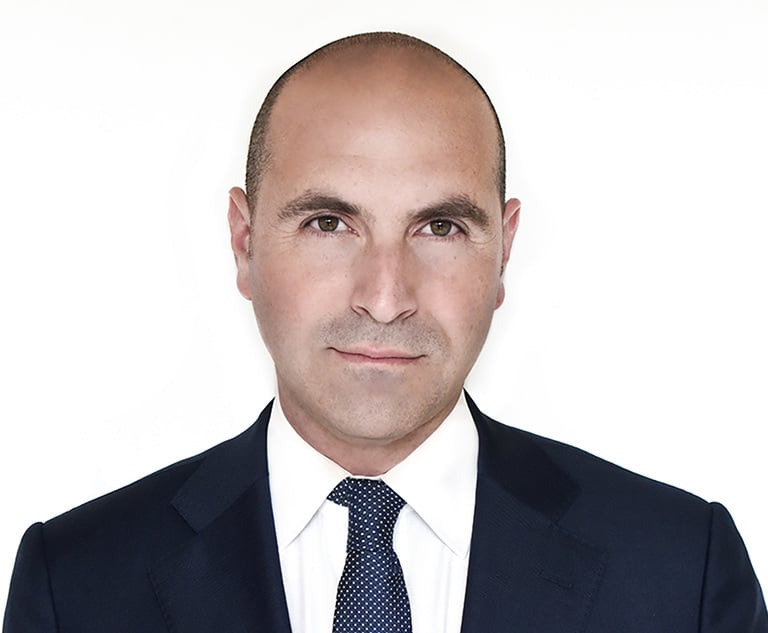Business Lawyers Look to Amended Bankruptcy Provision in $2 Trillion Stimulus Package
The CARES Act has a provision that will enable more small businesses to streamline the bankruptcy process and reorganize their affairs.
March 26, 2020 at 03:06 PM
4 minute read
 Jeffrey I. Snyder, a partner at Bilzin Sumberg, Allison Day, a partner at Genovese Joblove & Battista, and Jeffrey T. Kucera of K&L Gates. Courtesy photos
Jeffrey I. Snyder, a partner at Bilzin Sumberg, Allison Day, a partner at Genovese Joblove & Battista, and Jeffrey T. Kucera of K&L Gates. Courtesy photos
The $2 trillion coronavirus relief and economic stimulus package, which is expected to be signed into law by President Donald Trump on Friday, has a provision that will enable more small businesses to streamline the bankruptcy process and reorganize their affairs, according to South Florida business lawyers.
The stimulus package contained in the Coronavirus Aid, Relief and Economic Security (CARES) Act is the largest of its kind in modern American history and is in response to the coronavirus pandemic that has battered the economy. Should the CARES Act be signed into law, the bill includes changes to the Small Business Reorganization Act (SBRA) that went into effect in February 2020.
The SBRA presently applies to small business debtors that have about $2.7 million or less in secured and unsecured debt, which is available to both companies and individuals that have debts primarily from commercial or business activities. The CARES Act will increase that limit to $7.5 million for a one-year period.
Jeffrey I. Snyder, a partner at Bilzin Sumberg, said the changes would broaden access to the bankruptcy restructuring process.
"To the extent of you have a business that is impacted by COVID-19, but is an otherwise healthy business, but for whatever reason is unable to work out arrangements on its own with creditors," Snyder said, "you have this opportunity to take advantage of this faster, streamlined, less expensive process in order to reorganize based on your otherwise healthy business with monthly cash flow. Once it gets passed, they will be able to repay those debts over a three to five year period under a plan."
Snyder, in an interview with the Daily Business Review, said creditors are aware of the obstacles and the high costs that go into a chapter 11 bankruptcy. He said it is more likely that a debtor will take advantage of the bankruptcy process to reorganize, increasing the likelihood that the business will be able to repay its obligations to its creditors.
"It brings creditors to the table," Snyder said, "because bankruptcy should always be the last resort."
According to research from the JPMorgan Chase Institute, without new revenues, the typical small business has enough cash to last for 12 days. Having the option to restructure is among the reasons that Jeffrey T. Kucera, a partner at K&L Gates, said the new provisions would have a huge effect on small businesses in South Florida.
In 2019, Congress added a new section to Chapter 11 of the Bankruptcy Code , called the Small Business Reorganization Act or Subchapter Part V, which is included in new Code sections 1181 to 1195. Allison Day, a partner at Genovese Joblove & Battista, said the CARES Act amends section 1182. That means it greatly expands who can be a debtor in that section.
In the new Subchapter Part V, there is a trustee, but it is different from the trustee appointed in a typical chapter 11 case. In chapter 11 cases, a trustee is only appointed if there is evidence of gross mismanagement, fraud, or it is in the best interest of creditors.
"The debtor works with the trustee to reorganize the business and the new stimulus package increases the ability of small businesses to take part," Day said. "A lot of businesses have debt larger than $2.7 million."
This content has been archived. It is available through our partners, LexisNexis® and Bloomberg Law.
To view this content, please continue to their sites.
Not a Lexis Subscriber?
Subscribe Now
Not a Bloomberg Law Subscriber?
Subscribe Now
NOT FOR REPRINT
© 2025 ALM Global, LLC, All Rights Reserved. Request academic re-use from www.copyright.com. All other uses, submit a request to [email protected]. For more information visit Asset & Logo Licensing.
You Might Like
View All
Financially Grounded: South Florida-Based Silver Airways Files for Bankruptcy


US Judge Throws Out Sale of Infowars to The Onion. But That's Not the End of the Road for Sandy Hook Families
4 minute read
Growing Referral Network, Alternative Fees Have This Ex-Big Law’s Atty’s Bankruptcy Practice Soaring
5 minute readLaw Firms Mentioned
Trending Stories
- 1Public Notices/Calendars
- 2Wednesday Newspaper
- 3Decision of the Day: Qui Tam Relators Do Not Plausibly Claim Firm Avoided Tax Obligations Through Visa Applications, Circuit Finds
- 4Judicial Ethics Opinion 24-116
- 5Big Law Firms Sheppard Mullin, Morgan Lewis and Baker Botts Add Partners in Houston
Who Got The Work
J. Brugh Lower of Gibbons has entered an appearance for industrial equipment supplier Devco Corporation in a pending trademark infringement lawsuit. The suit, accusing the defendant of selling knock-off Graco products, was filed Dec. 18 in New Jersey District Court by Rivkin Radler on behalf of Graco Inc. and Graco Minnesota. The case, assigned to U.S. District Judge Zahid N. Quraishi, is 3:24-cv-11294, Graco Inc. et al v. Devco Corporation.
Who Got The Work
Rebecca Maller-Stein and Kent A. Yalowitz of Arnold & Porter Kaye Scholer have entered their appearances for Hanaco Venture Capital and its executives, Lior Prosor and David Frankel, in a pending securities lawsuit. The action, filed on Dec. 24 in New York Southern District Court by Zell, Aron & Co. on behalf of Goldeneye Advisors, accuses the defendants of negligently and fraudulently managing the plaintiff's $1 million investment. The case, assigned to U.S. District Judge Vernon S. Broderick, is 1:24-cv-09918, Goldeneye Advisors, LLC v. Hanaco Venture Capital, Ltd. et al.
Who Got The Work
Attorneys from A&O Shearman has stepped in as defense counsel for Toronto-Dominion Bank and other defendants in a pending securities class action. The suit, filed Dec. 11 in New York Southern District Court by Bleichmar Fonti & Auld, accuses the defendants of concealing the bank's 'pervasive' deficiencies in regards to its compliance with the Bank Secrecy Act and the quality of its anti-money laundering controls. The case, assigned to U.S. District Judge Arun Subramanian, is 1:24-cv-09445, Gonzalez v. The Toronto-Dominion Bank et al.
Who Got The Work
Crown Castle International, a Pennsylvania company providing shared communications infrastructure, has turned to Luke D. Wolf of Gordon Rees Scully Mansukhani to fend off a pending breach-of-contract lawsuit. The court action, filed Nov. 25 in Michigan Eastern District Court by Hooper Hathaway PC on behalf of The Town Residences LLC, accuses Crown Castle of failing to transfer approximately $30,000 in utility payments from T-Mobile in breach of a roof-top lease and assignment agreement. The case, assigned to U.S. District Judge Susan K. Declercq, is 2:24-cv-13131, The Town Residences LLC v. T-Mobile US, Inc. et al.
Who Got The Work
Wilfred P. Coronato and Daniel M. Schwartz of McCarter & English have stepped in as defense counsel to Electrolux Home Products Inc. in a pending product liability lawsuit. The court action, filed Nov. 26 in New York Eastern District Court by Poulos Lopiccolo PC and Nagel Rice LLP on behalf of David Stern, alleges that the defendant's refrigerators’ drawers and shelving repeatedly break and fall apart within months after purchase. The case, assigned to U.S. District Judge Joan M. Azrack, is 2:24-cv-08204, Stern v. Electrolux Home Products, Inc.
Featured Firms
Law Offices of Gary Martin Hays & Associates, P.C.
(470) 294-1674
Law Offices of Mark E. Salomone
(857) 444-6468
Smith & Hassler
(713) 739-1250






